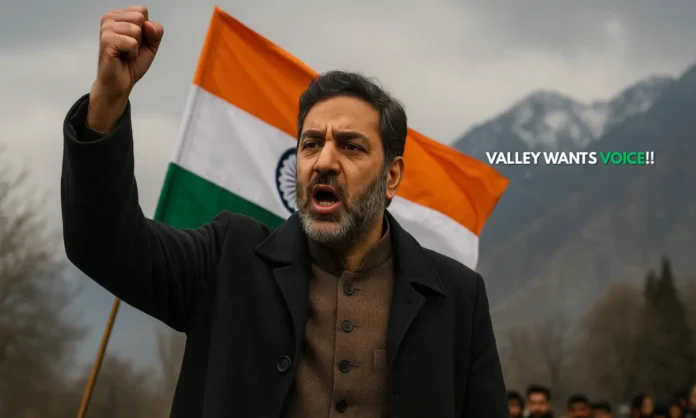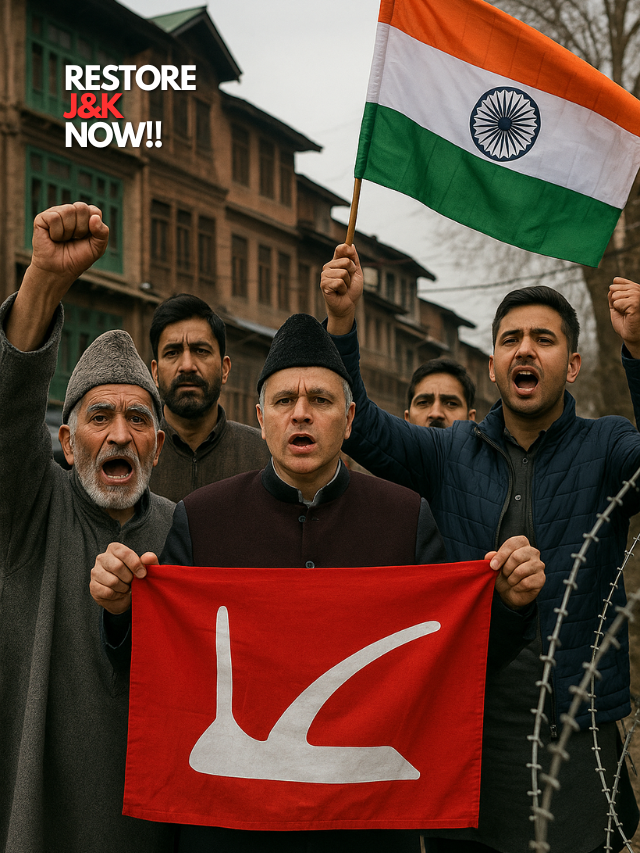Summary
- The National Conference has urged the Modi government to restore full statehood to Jammu and Kashmir.
- The appeal comes after the region’s show of solidarity with Indian forces during Operation Sindoor.
- NC leader Tanvir Sadiq calls it a critical trust-building moment as peace returns to the Valley.
‘Now Is the Time’: Kashmir’s Call for Dignity and Statehood
In the aftermath of Operation Sindoor and a tense military standoff with Pakistan, a rare moment of calm has returned to Jammu and Kashmir. But for many political voices in the Valley, this ceasefire offers not just relief—but opportunity. The National Conference (NC), led by Omar Abdullah, has publicly called on the Centre to fulfill its long-pending promise: the restoration of statehood to Jammu and Kashmir.
Tanvir Sadiq, a senior NC leader and MLA from Srinagar, made the appeal while highlighting how ordinary Kashmiris stood firmly with the Indian armed forces during recent shelling by Pakistan. “This is the time for the Centre to act,” he stated, describing the public’s rejection of cross-border terror as a loud, unified message of national allegiance.
Sadiq’s argument is rooted in political realism. For the Centre, restoring statehood would serve not just as a constitutional correction but as a critical confidence-building measure in a region that has long struggled with trust, representation, and dignity. After years of top-down governance following the 2019 revocation of Article 370, the demand has resurfaced—now wrapped in the language of loyalty and democratic healing.
Instead of Heavy-Handed Measures, Trust Kashmir’s Constituency of Peace:
— Kashmir On 𝕏 (@KashmironX) May 14, 2025
– The special assembly session was called to condemn the Pahalgam attack, not to discuss statehood.
– Statehood for J&K remains an ongoing conversation with the Government of India, and we will continue to… pic.twitter.com/bYkqtubJBs
A Post-Sindoor Political Moment
- The National Conference says Kashmiris stood by India during the latest military escalation.
- Operation Sindoor marked India’s strongest-ever airstrike response to cross-border terror.
- The return to peace, NC argues, should be met with political restitution from Delhi.
- Tanvir Sadiq emphasizes unity, civilian sacrifice, and the need to reward public trust.
The backdrop to this political appeal is critical. Operation Sindoor, launched on May 7 following the April 22 Pahalgam terror attack, marked a sharp escalation in India’s military posture toward Pakistan. With 26 civilians dead and multiple Indian strikes carried out across PoK and mainland Pakistan, the region teetered on the edge of prolonged conflict.
Amid the chaos, however, Kashmir’s civilians stood firm. Sadiq noted that people across Pulwama, Kupwara, and Uri defied fear and stood “not in our name” against Pakistan’s aggression. They didn’t flee, didn’t protest against India’s response—instead, they waited, helped one another, and in many cases aided Indian forces in relief efforts.
This, NC argues, is not just civic resilience—it’s a political statement. And the Centre, it says, must respond not just with gratitude but with structural reform. For Kashmiris who endured curfews, crackdowns, and political voids after the 2019 revocation of statehood, this is the first moment in five years where unity could be turned into democratic renewal.
Statehood as a Trust-Building Bridge
- The NC says restoring statehood will send a clear message of faith in Kashmir’s democratic maturity.
- Omar Abdullah has resumed ground visits to assess damages and reassure citizens post-Sindoor.
- The J&K government is preparing to seek Central assistance for rehabilitation and development.
- Critics argue that continued delay in restoring statehood could fuel political alienation.
While NC’s appeal is calibrated, it’s also pointed. The party is aware that realpolitik in Delhi may delay or dilute such reforms, but it has chosen this moment precisely because the political optics are in Kashmir’s favor.
Omar Abdullah’s return to active politics—touring affected areas, inspecting damage, and preparing assessments for central aid—has not gone unnoticed. His public visibility aims to re-establish the NC as a responsible, secular, and stabilizing force. In contrast to separatist calls or boycott campaigns, NC’s messaging has been focused on democratic restoration—not confrontation.
Restoring statehood won’t mean reviving Article 370—but it would restore an elected legislature, devolve administrative power, and symbolically end the phase of “direct rule” from New Delhi. For many Kashmiris, this isn’t just a political demand—it’s a plea for respect.
As Tanvir Sadiq put it, “This is the time.” Whether Delhi listens will define the next chapter of Centre–Valley relations.
Ceasefire or Stalemate?
- India and Pakistan agreed to halt military actions on May 10—but Pakistan violated the ceasefire within hours.
- While military tensions ease, the political void in Kashmir remains unresolved.
- Analysts warn that failing to deliver on the statehood promise could reinvigorate extremist narratives.
- Political engagement is now seen as critical to stabilizing the region long-term.
Despite the fragile ceasefire, there’s little illusion about Pakistan’s intentions. The violations post-May 10 are proof enough that India must remain vigilant. But security is only one part of the equation. Stability in Kashmir will increasingly depend on whether the Centre can reintroduce democratic norms with credibility.
That means not just deploying troops—but empowering civilians. Not just enforcing law—but restoring lawmaking. In short, moving from martial order to political normalcy.
As India positions itself on the global stage as the world’s largest democracy, its handling of Kashmir will remain under intense scrutiny. The restoration of statehood would offer a clear, internationally resonant signal that the region’s political future lies within India—not outside it.
Beyond Silence: A Time to Act
The National Conference’s call to restore statehood is more than a political demand—it is a litmus test for India’s commitment to constitutional balance and federal integrity. The Centre has long insisted that peace and progress must precede political concessions. In the wake of Operation Sindoor, the people of Jammu and Kashmir have delivered on their part.
Now, it’s the Centre’s turn. By restoring statehood, the government could redefine its Kashmir doctrine—from control to cooperation, from surveillance to self-governance. For a region that has known too much of fear and too little of faith, it might finally be time to replace silence with sovereignty.



